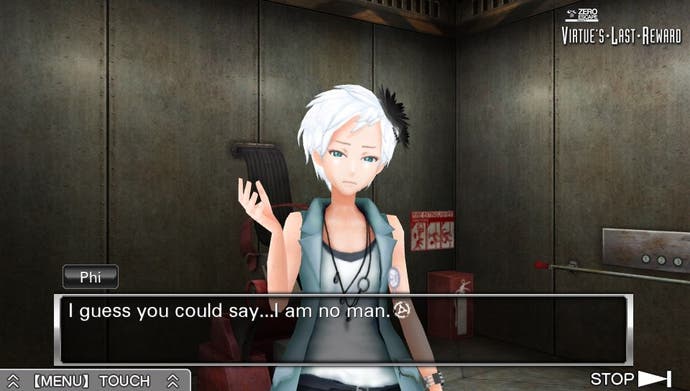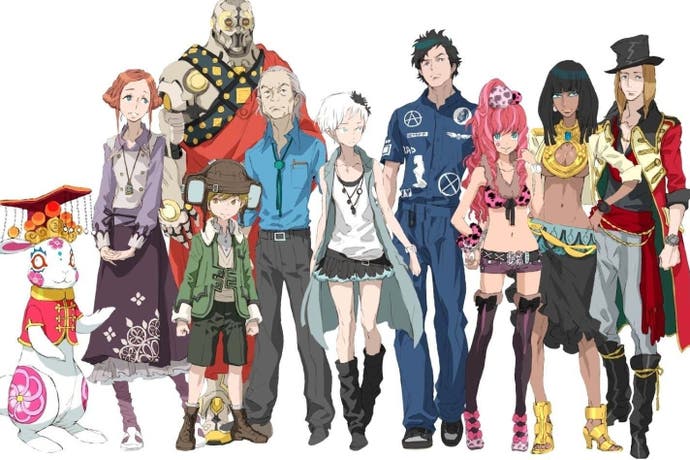Virtue's Last Reward review
Novel ideas.
A game, Sid Meier once famously said, is a series of meaningful choices. There'll be those who'd argue that Virtue's Last Reward - an extension of Chunsoft's visual novel series that began with 999: Nine Hours, Nine Persons, Nine Doors - isn't really a game at all. But its choices, when they eventually arise, are as meaningful as any you're likely to come across in the medium.
Virtue's Last Reward is a direct sequel to 999, and another rare example of a visual novel making its way to the West. It's not surprising that they're so slim in number over here; their reams of cloying text, their candy-coloured characterisation and their hyperactive melodrama ensure they travel poorly outside of Japan, and they're impenetrable to all but the most stubborn of players.
Virtue's Last Reward is no different, on the surface at least. It's the not-so-distant future, and you awake in a strange, cold complex and thrown in with an array of mysterious characters who all slot into existing archetypes. There's a prickly pixie, a devilish dandy and the requisite amnesiac, though they all share the narrative darkness with you.
You're all united to play the Ambidex edition of the Nonary Game, an odd quest that sees each contestant wearing a wrist-watch that displays a single digit and can punish failure by lethal injection. How you succeed, and why you're there, is a mystery that takes time to solve. It's a sheer cliff-face of enigma, slowly chipped away by each screen of dialogue, each character interaction and each sluggishly unfurling set-piece.

It's a game of patience, and at first you'd be forgiven for wondering why you're bothering to stick around. This is a story that's communicated by one implausible plot twist piled sloppily on top of another, and that in its more everyday moments wallows in screen after screen of doughy exposition. It's slow and it's sticky, and it's thickened by writing that's torn between tenderness and tawdriness, drowning you in melancholy and dealing with death and questions of identity before forcing you to listen, for minutes on end, to an AI rabbit blithely asking how everybunny is.
The few puzzles that punctuate the long, tiring exposition aren't much better, really. They're sadistic single-room tests conjured up in some horrible marriage between Hershel Layton and Jigsaw, little strings of logic mangled into messy clumps that are unpleasant to unfurl. The inventory system asks you do just that in gardening gloves, providing a cumbersome set of menus that turn every puzzling headache into a throbbing migraine.
The content's poor, then, but the structure is ingenious. In fact, with Virtue's Last Reward, the structure is the content, and so devilishly complex is the narrative architecture that Chunsoft's managed to create something at once brutally inane and absolutely brilliant.
It helps that beneath the droning explanations and exchanges there is a very human and very believable cast. No matter what the situation they find themselves in (and Virtue's Last Reward revels in throwing characters in the most preposterous of situations), they maintain a sliver of humanity to hold onto. It's melodrama, yes, but it's powered by real emotion.
"At one point it's a murder-mystery, at another it's a tender human drama and eventually it's a looping, self-referential sci-fi story that's as smart and twisted as Primer."

It helps, too, that Virtue's Last Reward allows you to get lost in its lattice much more readily than its predecessor. 999 offered six different outcomes to its story, but to see each one you'd have to play the game from start to finish and choose the relevant path. Here, there are 25 different outcomes, and each decision that leads you to them can be returned to at will in an ever-expanding flow chart tracking your progress through the game.
The decisions are often loaded - there's a reliance on the prisoner's dilemma here, and it's that central question of betrayal or alliance that forms the thrust of much of Virtue's story - but their significance is never really revealed immediately. Indeed, they likely won't even become clear to you on your first play-through.
When the credits roll on Virtue's Last Reward, which they'll do after a handful of hours, it's not the end - rather, it's just telling you that it's time for another roll of the die and another run through the pachinko game of chance that is the game's main narrative. It's a deafening clutter of MacGuffins, but it's thrilling to simply lose yourself in the white noise they produce.
Its real genius, however, is how it pulls each of these threads together, ties them up in knots and then sets them whirling along again. Virtue's Last Reward disposes of the fourth wall soon after the first play-though, making sly nods at the limited player agency it offers and to its own branching story. The melodrama then branches out to become something deeper, and something different; at one point it's a murder-mystery, at another it's a tender human drama and eventually it's a looping, self-referential sci-fi story that's as smart and twisted as the likes of Primer.
To reveal how it does so would be to ruin the fun and take away the dizzying, off-kilter moments that make Virtue's Last Reward such a frequent joy. A strange, frustrating and incredibly smart game, then. Virtue's Last Reward's fiction can tend to be a little over-ripe, but it weaves a web that's a pleasure to get lost in.

